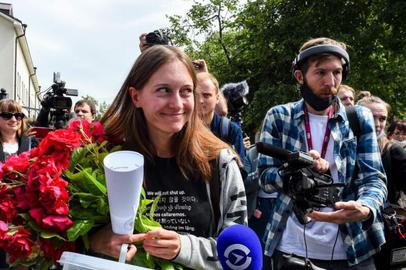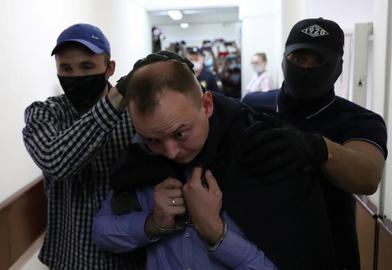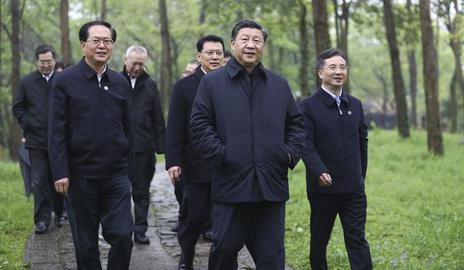Emil Filtenborg and Stefan Weichert are independent journalists based in Ukraine. In a weekly series for IranWire, they examine the landscape of disinformation in Russia and some of the false information that has emanated from the country since the outbreak of coronavirus.
Since the very first newspapers rolled off the printing presses, the existence a free and independent media has been considered the cornerstone of any democracy.
But since the coronavirus pandemic struck Europe in March, independent media outlets have been placed under unprecedented strain. This is especially true in Eastern Europe, where Russian disinformation has infected the discursive arena in many countries, while the media is also facing growing political interference.
A new report by the Berlin-based NGO n-ost and the Hungarian branch of German political foundation Friedrich Ebert Stiftung (FES) is highlighting these problems. The joint summary points out two main challenges to Eastern European media today: the lack of a financial means of survival for independent media, and an increase in governments’ or oligarchs’ influence on the media.
“The pandemic has come to magnify existing problems in the region’s media landscape,” the report states. “It now falls to policymakers to look closely. A proper diagnosis could ensure the survival of robust, independent, and professional journalism across the region – and the journalists of this report are unanimous in saying that its survival is indeed at stake.”
The researchers examined the media landscape in Bulgaria, Croatia, the Czech Republic, Hungary, North Macedonia, Poland, Romania, Serbia and Slovenia, interviewing journalists and academics. While the issue appears to be confined to one sector, it has knock-on effects for society as a whole – and for the issue of disinformation.
Independent Press is Part of the Solution
Mark Galeotti is an honorary professor at University College London’s School of Slavonic & East European Studies. Open democratic societies, he tells IranWire, are currently the best at combating disinformation and a key reason for that is the presence of an “objective, active, inquisitive media.”
“Open democratic societies work best against disinformation,” Galeotti says, “[due to] people being able to question and interrogate the lies they are hearing, journalists being able to investigate stories, and populations becoming more media aware.”
“When the media becomes more financially marginalized, it becomes harder to stay honest. If it has few advertisers and a piece might anger one of them, they might be tempted not to run it.”
Galeotti points to Russia – his field of expertise – where he says there is “too little” free, independent media. That has another unwanted side effect: “Russians are willing to question the official line from the Kremlin, but they question everything else too, which is why they are so susceptible to conspiracy theories. They have fallen into a world where everything is a lie. But believing nothing is as bad as believing everything. You need independent media to show that truth is achievable.”
But while Galeotti sees independent media as a critical element in the open democratic societies, he still does not believe they are guarantors of unbiased coverage, because they are more exposed to financial interests.
Journalist Fined for Journalism
In another shocking case of interference in Russia’s domestic media, a Russian freelance journalist and contributor for Radio Free Europe/Radio Liberty (RFERL) was fined 500,000 rubles (just under US$7,000) this week for “publicly inciting terrorism.” The journalist, Svetlana Prokopyeva, now finds herself on a list of “terrorists and extremists.”
Prokopyeva’s alleged crime was to speak on the airwaves for RFERL in 2018, discussing a case of a 17-year-old man who had committed a suicide bombing at the offices of the Federal Security Service: the Russian intelligence service formed from the ashes of the KGB.
Prosecutors had initially asked the judge to imprison Prokopyeva for six years and ban her from working as a journalist for four years. The punishment she finally received was much lighter. But nonetheless, media and human rights organizations including Human Rights Watch have decried the sentence as a “devastating blow to media freedom in Russia”.
The story was covered by the Moscow Times, DFERL, Deutsche Welle and a multitude of others. Daisy Sindelar, acting president of RFERL, also condemned the actions taken by the Russian court, which Prokopyeva is now appealing. “Svetlana’s conviction means that there is no presumption of innocence, no protections for journalists against the brute force of the state,” she said. “Her case recalls the show trials that were used by Soviet authorities to punish critics. It is a grim assault against free speech and the mission of an independent press.”
This is the latest in a litany of such attacks on free media inside Russia. Reporters Without Borders, which works to ensure the safety of journalists worldwide, has heavily criticised the Putin administration’s attitude towards the press.
“To avoid going down in history as gravedigger of the freedoms guaranteed in Russia’s young constitution, you must change course,” RSF has warned in a 2018 open letter to Putin. “We ask you to ensure the repeal of all the draconian laws adopted during your latest term, to release the national TV channels from state control, to allow independent media outlets to operate without being harassed, and to end the climate of hatred and impunity to which government critics are exposed.”
Ex-Journalist Detained in Russia
According to a recent report by Reuters, footage released by the FSB shows Ivan Safronov – a journalist who previously worked for Kommersant, one of the larger Russian newspapers with a daily circulation of around 120,000 – being detained outside his flat in Moscow. Safronov is accused of spying for NATO as he used to cover military affairs for the paper.
Kremlin spokesperson Dmitry Peskov has said that that he does not believe that the allegations against Safronov are related to his work as a journalist. But many others working in the media fear that this might be the beginning of a new crackdown on journalism. The same article by Reuters points out that some of Safronov’s former colleagues protested against his detention – and then they, too, were detained.
Also in this series:
Missing Data, Mud-Slinging and “Miracle Cures”: Why Disinformation Is Bad For Your Health
Iranian Online Network Still Peddling Coronavirus Disinformation
Putin’s Domestic Problems Eclipse Russian Disinformation Campaigns
China's Campaign to Protect President Xi against Coronavirus Criticism
Chinese Embassies Work Overtime to Diffuse International Fury Over Coronavirus
Russia Bans Coronavirus "Fake News" and Slams US Over Press Freedom
China Blocks Investigations Amid Refusal to Shut Down Wet Markets
From Coronavirus to the Second World War: On the Frontlines of the Russian Disinformation Battle
Russia Blames West for Propaganda While Reporting Unlikely Number of Covid-19 Deaths
As Criticism of China Falters, Time for a NATO for Human Rights?
Guest Post From Russia: How do You Put the Brakes on a Fake News Machine?
Has China Really Given Assent to a Global Coronavirus Review?
Russian Disinformation Back to Targeting Ukraine as Putin Declares Covid-19 Peak has Passed
Will the Post-Coronavirus World Stand Up to China's Bullying Business Tactics?
Coronavirus: An Opportunity to Advance Russian Interests in Latin America
The Shi Zhengli Identification Criteria: How Do We Know Where Coronavirus First Emerged?
Covid-19 and Black Lives Matter Unrest Targeted by Russian Disinformation
Occupy First, Talk Later: China Turns Border Conflict Into PR Opportunity
China Deploys Coercive Tactics to Deal with Disinformation Accusation
Putin Tries to Rewrite War History to Assert Russia's Position on the World Stage
Revealed: The Depth of China’s Influence on European News
Putin Can Stay: The Use of Disinformation in Russia’s Constitutional Vote
visit the accountability section
In this section of Iran Wire, you can contact the officials and launch your campaign for various problems


























comments